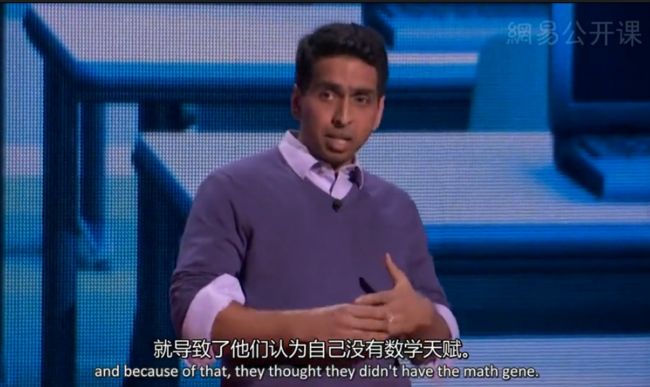Sal Khan - let's teach for mastery ,not for test scores
【TED】考试分数不是教育的目的_考试分数不是教育的目的_网易公开课
(视频请戳↑↑↑)
教育的目的不是分数,而是mastery . mastery = understanding of a subject 是彻彻底底地理解和掌握,知其然知其所以然。反过来,我们的学习也是一样,学习的目的是掌握所学的内容,变成更好的自己,而不是为了考试过关。
可汗的演讲给了我三个印象深刻的点:
1. 学习是有规律可循的。
有很多同学:考试不理想,产生挫败感,觉得自己没天赋,放弃。
They thought they didn't have the math gene. But when they were a bit older,they took a little agency and decided to engage.They found resources like Khan Academy and they were able to fill in those gaps and master those concepts,and that reinforced their mindset that it wasn't fixed; that they actually were capable of learning mathematics.
学武术也好,学乐器也好,掌握新技能都是需要一个途径一个过程的。你必须一直练习白带技巧,掌握了,才能进阶到黄带;学习乐器的方式:一遍遍练习最基本的曲目,只有掌握了它们,才能去挑战更难的那些。
In a martial art, you would practice the white belt skills as long as necessary, and only when you've mastered it you would move on to become a yellow belt. It's the way you learn a musical instrument: you practice the basic piece over and over again,and only when you've mastered it, you go on to the more advanced one.
2. 造房子的比喻。
我们有两个礼拜的时间打地基,时间到了,检测部门的人来说,这里有问题那里有问题,给你70分。但是,告诉你继续往上建。等你搭好一层二层,检测部门又来给你评分。虽然有问题,但是还不停往上搭。等到你搭到四楼的时候,整个房子轰然倒塌。
But what was really broken was the process. We were artificially constraining how long we had to something, pretty much ensuring a variable outcome, and we took the trouble of inspecting and identifying those gaps, but then we built right on top of it.
有人会说,如果根据每一位学生的补缺补漏去个别辅导的话,这不太可能实现。但,信息社会改变了传统的教育方式,把不可能变为可能。可汗学院,就是个例子。
And it's clear that some things are happening. In the industrial age, society was a pyramid. At the base of the pyramid, you needed human labor. In the middle of the pyramid, you had an information processing, a bureaucracy class, and at the top of the pyramid, you had your owners of capital and your entrepreneurs and your creative class.
But we know what's happening already, as we go into this information revolution. The bottom of that pyramid, automation, is going to take over. Even that middle tier, information processing, that's what computers are good at.
3. 未来的社会形态。
金字塔底端,自动化将取代人力。中间层信息处理的这一段,计算机做得比谁都好。所以,人,将何去何从?
So as a society, we have a question: All this new productivity is happening because of this technology, but who participates in it? Is it just going to be that very top of the pyramid, in which case, what does everyone else do? How do they operate? Or do we do something that's more aspirational? Do we actually attempt to invert the pyramid, where you have a large creative class, where almost everyone can participate as an entrepreneur, an artist, as a researcher?
讲者对未来 “倒转金字塔” 的憧憬,不是不会发生,而是正在发生。每个人都成为企业家、艺术家,或是研究人员?有没有这个可能性?
I really think that this is all based on the idea that if we let people tap into their potential by mastering concepts, by being able to exercise agency over their learning, that they can get there. And when you think of it as just a citizen of the world, it's pretty exciting.
Think about the type of equity we can we have,and the rate at which civilization could even progress. And so, I'm pretty optimistic about it. I think it's going to be a pretty exciting time to be alive.
想象一下我们所能拥有的那种平等,想象文明所能达到的那种境界。对此,我充满信心。我认为这个时刻将令人无比激动人心。
